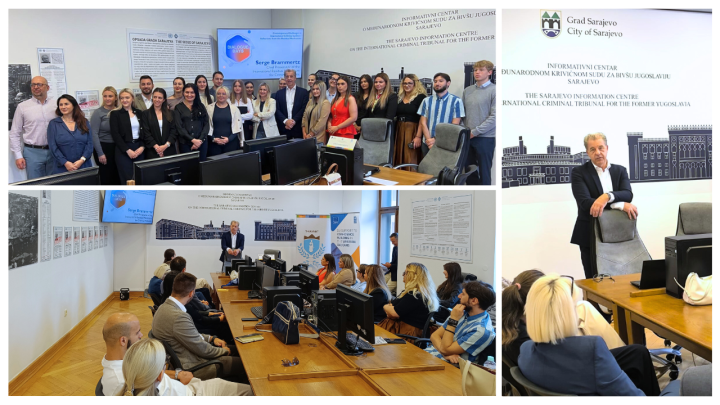Discussion with IRMCT Chief Prosecutor Held at the Sarajevo Information Centre on the ICTY
Prosecutor of the International Residual Mechanism for Criminal Tribunals (IRMCT), Mr. Serge Brammertz, met today with a group of 30 young legal professionals from Bosnia and Herzegovina at the Sarajevo Information Centre on the ICTY. The event was organised by the Association “PRAVNIK” with the support of the Mechanism Information Programme for Affected Communities (MIP).
The discussion focused on contemporary challenges in the field of international criminal justice and the ongoing relevance of the ICTY’s legacy in the region. Mr. Brammertzreflected on the current state of war crimes prosecutions in the Western Balkans, underscoring the need for sustained commitment at the national level. He also addressed concerning trends, such as the continued glorification of convicted war criminals and the denial of judicially established facts, noting the negative impact such developments have on justice and reconciliation.
Participants engaged in a dialogue with the Prosecutor Brammertz on a range of topics, including the integration of international legal standards into domestic systems, strategies to strengthen accountability mechanisms, and the importance of institutional independence. Mr. Brammertz emphasised the vital role of legal professionals in shaping a justice system that is responsive to the needs of victims and rooted in the rule of law.
The event was made possible through the longstanding cooperation between MIP, the Association “PRAVNIK,” and the Sarajevo Information Centre on the ICTY. Together, these partners continue to foster a space for learning, dialogue, and critical engagement with the legacy of international criminal tribunals, and to support the development of a new generation of professionals committed to justice and accountability.
This event forms part of the MIP's ongoing efforts to support projects and events implemented by civil society organizations active in the field of transitional justice in the former Yugoslavia.
The aim of the MIP is to improve the knowledge and understanding of citizens and communities in the countries of the former Yugoslavia about the crimes committed during the conflicts of the 1990s, based on the jurisprudence of the ICTY and the Mechanism.
The MIP is funded by the European Union.

Prosecutor of the International Residual Mechanism for Criminal Tribunals (IRMCT), Mr. Serge Brammertz, met today with a group of 30 young legal professionals from Bosnia and Herzegovina at the Sarajevo Information Centre on the ICTY. The event was organised by the Association “PRAVNIK” with the support of the Mechanism Information Programme for Affected Communities (MIP).
The discussion focused on contemporary challenges in the field of international criminal justice and the ongoing relevance of the ICTY’s legacy in the region. Mr. Brammertzreflected on the current state of war crimes prosecutions in the Western Balkans, underscoring the need for sustained commitment at the national level. He also addressed concerning trends, such as the continued glorification of convicted war criminals and the denial of judicially established facts, noting the negative impact such developments have on justice and reconciliation.
Participants engaged in a dialogue with the Prosecutor Brammertz on a range of topics, including the integration of international legal standards into domestic systems, strategies to strengthen accountability mechanisms, and the importance of institutional independence. Mr. Brammertz emphasised the vital role of legal professionals in shaping a justice system that is responsive to the needs of victims and rooted in the rule of law.
The event was made possible through the longstanding cooperation between MIP, the Association “PRAVNIK,” and the Sarajevo Information Centre on the ICTY. Together, these partners continue to foster a space for learning, dialogue, and critical engagement with the legacy of international criminal tribunals, and to support the development of a new generation of professionals committed to justice and accountability.
This event forms part of the MIP's ongoing efforts to support projects and events implemented by civil society organizations active in the field of transitional justice in the former Yugoslavia.
The aim of the MIP is to improve the knowledge and understanding of citizens and communities in the countries of the former Yugoslavia about the crimes committed during the conflicts of the 1990s, based on the jurisprudence of the ICTY and the Mechanism.
The MIP is funded by the European Union.